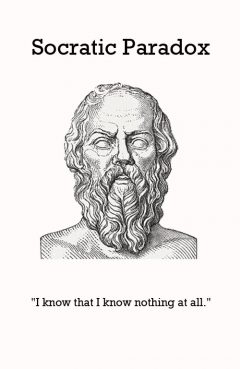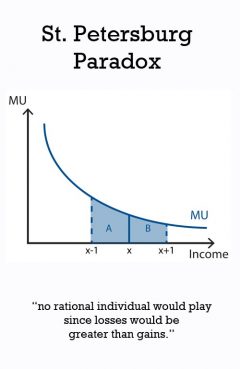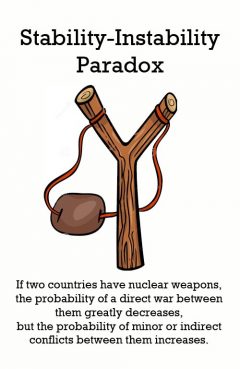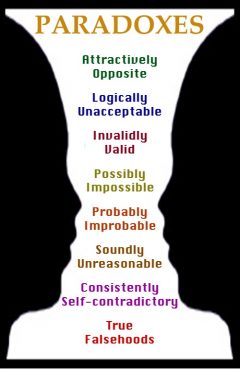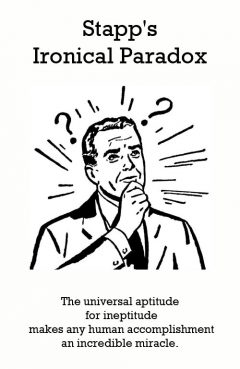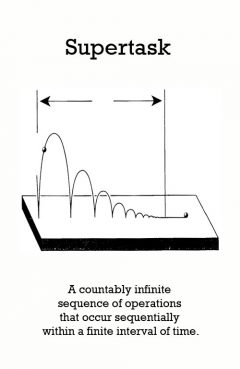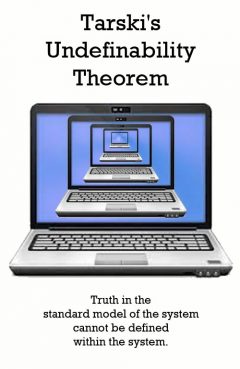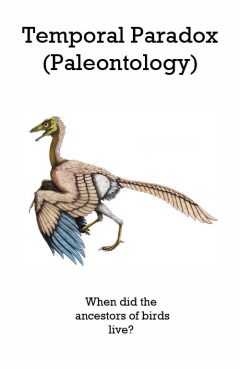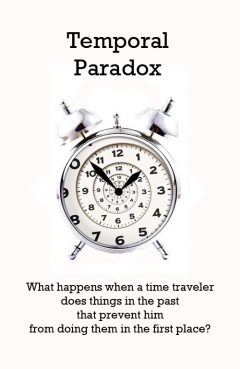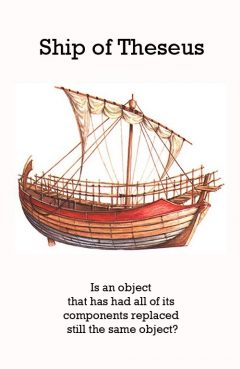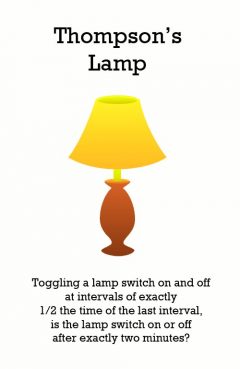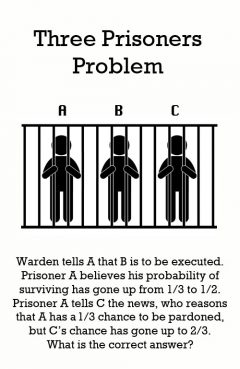The Socratic Paradox
Release Date: //
Country of Release:
Length:
MPAA:
Medium: Paradox
Genre:
Release Message: "I know that I know nothing at all." Authored by Socrates.
Description: The phrase "I know that I know nothing" or "I know one thing: that I know nothing" sometimes called the Socratic paradox, is a well-known saying that is derived from Plato's account of the Greek philosopher Socrates. This saying is also connected and/or conflated with the answer Socrates is said to have received from Pythia, the oracle of Delphi, in answer to the question "who is the wisest man in Greece?".
Sorites Paradox (Paradox Of The Heap)
Release Date: //
Country of Release:
Length:
MPAA:
Medium: Paradox
Genre:
Release Message: One grain of sand is not a heap. If you don't have a heap, then adding only one grain of sand won't give you a heap. Then no number of grains of sand will make a heap. Authored by Eubulides.
Description: If 1000000 grains is a heap then 999999 grains is a heap. If 999999 grains is a heap then 999998 grains is a heap. If ... ...then 1 grain is a heap. One grain of sand is not a heap. If you don't have a heap, then adding only one grain of sand won't give you a heap. Then no number of grains of sand will make a heap. Similarly, one hair can't make the difference between being bald and not being bald. But then if you remove one hair at a time, you will never become bald. Also similarly, one dollar will not make you rich, so if you keep this up, one dollar at a time, you will never become rich (no matter how many you obtain).
St. Petersburg Paradox
Release Date: 9/9/1713
Country of Release:
Length:
MPAA:
Medium: Paradox
Genre:
Release Message: People will only offer a modest fee for a reward of infinite expected value. Authored by Daniel Bernoulli.
Description: People will only offer a modest fee for a reward of infinite expected value. In economics, the St. Petersburg paradox is a paradox related to probability theory and decision theory. It is based on a particular (theoretical) lottery game (sometimes called St. Petersburg Lottery) that leads to a random variable with infinite expected value, i.e., infinite expected payoff, but would nevertheless be considered to be worth only a very small amount of money. The St. Petersburg paradox is a classical situation where a na¥ve decision criterion (which takes only the expected value into account) would recommend a course of action that no (real) rational person would be willing to take. Several resolutions are possible. The paradox is named from Daniel Bernoulli's presentation of the problem and his solution, published in 1738 in the Commentaries of the Imperial Academy of Science of Saint Petersburg (Bernoulli 1738). However, the problem was invented by Daniel's cousin Nicolas Bernoulli who first stated it in a letter to Pierre Raymond de Montmort of September 9, 1713 (de Montmort 1713).
Stability-Instability Paradox
Release Date: //
Country of Release:
Length:
MPAA:
Medium: Paradox
Genre:
Release Message: When two countries each have nuclear weapons, the probability of a direct war between them greatly decreases, but the probability of minor or indirect conflicts between them increases.
Description: When two countries each have nuclear weapons, the probability of a direct war between them greatly decreases, but the probability of minor or indirect conflicts between them increases. The stability_instability paradox is an international relations theory regarding the effect of nuclear weapons and mutually assured destruction. It states that when two countries each have nuclear weapons, the probability of a direct war between them greatly decreases, but the probability of minor or indirect conflicts between them increases. This occurs because rational actors want to avoid nuclear wars, and thus they neither start major conflicts nor allow minor conflicts to escalate into major conflictsthus making it safe to engage in minor conflicts. For instance, during the Cold War the United States and the Soviet Union never engaged each other in warfare, but fought proxy wars in Korea, Vietnam, Angola, the Middle East, Nicaragua and Afghanistan and spent substantial amounts of money and manpower on gaining relative influence over the third world. A study published in the journal of conflict resolution in 2009 quantitatively evaluated the nuclear peace hypothesis, and found support for the existence of the stability_instability paradox. The study determined that while nuclear weapons promote strategic stability, and prevent large scale wars, they simultaneously allow for more lower intensity conflicts. When a nuclear monopoly exists between two states, and their opponent does not, there is a greater chance of war. In contrast, when there is mutual nuclear weapon ownership with both states possessing nuclear weapons, the odds of war drop precipitously.
Stadium Paradox
Stapp's Ironical Paradox
Release Date: //
Country of Release:
Length:
MPAA:
Medium: Paradox
Genre:
Release Message: "The universal aptitude for ineptitude makes any human accomplishment an incredible miracle." Authored by John Stapp.
Description: "The universal aptitude for ineptitude makes any human accomplishment an incredible miracle."
Status Paradox
Stockdale Paradox
Strategy Paradox
Supertasks (Ross-Littlewood's Paradox, Benardette's Paradox)
Release Date: //
Country of Release:
Length:
MPAA:
Medium: Paradox
Genre:
Release Message: A countably infinite sequence of operations that occur sequentially within a finite interval of time Authored by James F. Thomson.
Description: Supertasks can result in paradoxes such as the Ross-Littlewood paradox and Benardete's paradox.
Supplee's Paradox (aka submarine paradox)
Release Date: //
Country of Release:
Length:
MPAA:
Medium: Paradox
Genre:
Release Message: The buoyancy of a relativistic object (such as a bullet) appears to change when the reference frame is changed from one in which the bullet is at rest to one in which the fluid is at rest.
Description: In relativistic physics, Supplee's paradox (also called the submarine paradox) arises when considering the buoyant force exerted on a relativistic bullet immersed in a fluid subject to an ambient gravitational field. If a bullet with neutral buoyancy passes through a fluid at a relativistic speed, will its increased mass in the fluid's frame of reference cause it to sink, or will the fluid's increased mass in the bullet's frame of reference cause it to rise? The paradox was apparently first discussed by James M. Supplee.
Tarski's Undefinability Theorem
Release Date: //1936
Country of Release:
Length:
MPAA:
Medium: Paradox
Genre:
Release Message: The theorem applies more generally to any sufficiently strong formal system, showing that truth in the standard model of the system cannot be defined within the system. Authored by Alfred Tarski.
Description: Truth in the standard model of the system cannot be defined within the system. Arithmetical truth cannot be defined in arithmetic. Tarski's undefinability theorem, stated and proved by Alfred Tarski in 1936, is an important limitative result in mathematical logic, the foundations of mathematics, and in formal semantics. Informally, the theorem states that arithmetical truth cannot be defined in arithmetic. The theorem applies more generally to any sufficiently strong formal system, showing that truth in the standard model of the system cannot be defined within the system.
Tea Leaf Paradox
Release Date: //
Country of Release:
Length:
MPAA:
Medium: Paradox
Genre:
Release Message: When a cup of tea is stirred, the leaves assemble in the center, even though centrifugal force pushes them outward.
Description: When a cup of tea is stirred, the leaves assemble in the center, even though centrifugal force pushes them outward.
Temporal Paradox (paleontology)
Release Date: //
Country of Release:
Length:
MPAA:
Medium: Paradox
Genre:
Release Message: When did the ancestors of birds live? Authored by Alan Feduccia .
Description: The concept of a "temporal paradox" is based on the following facts. The consensus view is that birds evolved from dinosaurs, but the most bird-like dinosaurs, including almost all of the feathered dinosaurs and those believed to be most closely related to birds are known mostly from the Cretaceous, by which time birds had already evolved and diversified. If bird-like dinosaurs are the ancestors of birds they should, then, be older than birds, but Archaeopteryx is 155 million years old, while the very bird-like Deinonychus is 35 million years younger. This idea is sometimes summarized as "you can't be your own grandmother". As Dodson pointed out: I hasten to add that none of the known small theropods, including Deinonychus, Dromaeosaurus, Velociraptor, Unenlagia, nor Sinosauropteryx, Protarchaeopteryx, nor Caudipteryx is itself relevant to the origin of birds; these are all Cretaceous fossils ... and as such can at best represent only structural stages through which an avian ancestor may be hypothezised to have passed.[3]
Temporal Paradox
Release Date: //
Country of Release:
Length:
MPAA:
Medium: Paradox
Genre:
Release Message: What happens when a time traveler does things in the past that prevent him from doing them in the first place?
Description: What happens when a time traveler does things in the past that prevent him from doing them in the first place? A temporal paradox, time paradox, or time travel paradox is a paradox, an apparent contradiction, or a logical contradiction that is associated with the idea of time and time travel. Temporal paradoxes fall into two broad groups: consistency paradoxes exemplified by the grandfather paradox; and causal loops.
Theories Of Humor
Theseus' Paradox (aka Ship Of Theseus, George Washington's axe or Grandfather's old axe)
Release Date: //100
Country of Release:
Length:
MPAA:
Medium: Paradox
Genre:
Release Message: It seems like you can replace any component of a ship, and it is still the same ship. So you can replace them all, one at a time, and it is still the same ship. However, you can then take all the original pieces, and assemble them into a ship. That, too, is the same ship you began with.
Description: The ship of Theseus, also known as Theseus' paradox, is a thought experiment that raises the question of whether an object which has had all of its components replaced remains fundamentally the same object. The paradox is most notably recorded by Plutarch in Life of Theseus from the late first century. Plutarch asked whether a ship which was restored by replacing each and every one of its wooden parts remained the same ship. The paradox had been discussed by more ancient philosophers such as Heraclitus, Socrates, and Plato prior to Plutarch's writings; and more recently by Thomas Hobbes and John Locke. Several variants are known, notably "grandfather's axe". This thought experiment is "a model for the philosophers"; some say, "it remained the same," some saying, "it did not remain the same".[1]
Thomson's Lamp
Release Date: //1954
Country of Release:
Length:
MPAA:
Medium: Paradox
Genre:
Release Message: Is the lamp switch on or off after exactly two minutes?
Description: Consider a lamp with a toggle switch. Flicking the switch once turns the lamp on. Another flick will turn the lamp off. Now suppose that there is a being able to perform the following task: starting a timer, he turns the lamp on. At the end of one minute, he turns it off. At the end of another half minute, he turns it on again. At the end of another quarter of a minute, he turns it off. At the next eighth of a minute, he turns it on again, and he continues thus, flicking the switch each time after waiting exactly one-half the time he waited before flicking it previously. The sum of this infinite series of time intervals is exactly two minutes. The following questions are then considered: Is the lamp switch on or off after exactly two minutes? Would the final state be different if the lamp had started out being on, instead of off?
Three Prisoners Problem
Release Date: //1959
Country of Release:
Length:
MPAA:
Medium: Paradox
Genre:
Release Message: Warden tells A that B is to be executed Prisoner A believes his probability of surviving has gone up from 1/3 to 1/2. Prisoner A tells C the news, who reasons that A has a 1/3 chance to be pardoned, but C's chance has gone up to 2/3. What is the correct answer? Authored by Martin Gardner.
Description: The Three Prisoners problem appeared in Martin Gardner's "Mathematical Games" column in Scientific American in 1959. It is mathematically equivalent to the Monty Hall problem with car and goat replaced with freedom and execution respectively, and also equivalent to, and presumably based on, Bertrand's box paradox.
